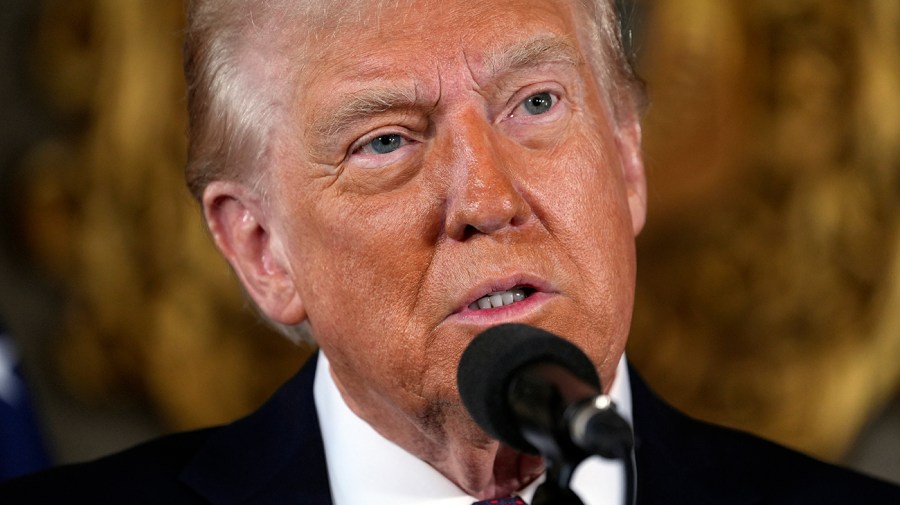
President-elect Trump is making a final stand in his criminal cases as his White House return approaches, hoping to diminish what is left of his prosecutions before they are shelved.
With less than two weeks until his inauguration, Trump has looked to block his New York sentencing on 34 felonies and the public release of special counsel Jack Smith’s final report.
Trump’s efforts spurred fights in six different courts this week, effectively marking the endgame of the courtroom campaign that didn’t deter catapulting him back to the nation’s highest office but still stands to damage his legacy.
“Until January 20, I expect every other day, until then, there’ll be some new news that will happen in Trump legal world,” said Catherine Christian, a former prosecutor in the Manhattan district attorney’s office.
Trump is not expected to face any punishment after once staring down 91 criminal charges across four prosecutions as he asked voters to give him a second term.
His election victory resulted in his two federal cases being dismissed, his Georgia case is in limbo after the top prosecutor was removed and the judge in his New York case signaled he won’t hand down any prison time.
But the cases could pack a final punch.
In New York, Trump successfully pushed his sentencing past the election, delaying the proceeding three times. This week, he has hoped for a fourth.
Judge Juan Merchan’s decision to move ahead with Trump’s sentencing Friday set up a last-minute appellate battle as the president-elect sought to block it.
Merchan signaled he will release Trump without any conditions, but the sentencing would still cement the president-elect’s status as a convicted felon.
“Calling him a convicted felon, as many have done, I always sort of wince. I’m like, well, he kind of isn’t yet,” said Christian. “This really is about the stigma, the status, because once you’re sentenced, that’s the final judgment until it’s been reversed on appeal.”
Trump has asked to call off the sentencing while mounting an effort to dismiss the case over claims he is immune as both a former president and president-elect.
On Monday, Trump’s attorneys urged Merchan to halt it; he declined. The next day, a midlevel appeals court hastily held oral arguments and rejected Trump’s delay request. New York’s top court denied it on Thursday.
Now, Trump’s remaining hope rests with the Supreme Court.
His emergency application is backed by former Attorney General Edwin Meese and Steven Calabresi, co-chair of the Federalist Society, a prominent conservative legal group.
“Today, moreover, there are fifty states with roughly 2,300 county prosecutors, some of them quite partisan,” lawyers for the duo wrote in a friend-of-the-court brief. “This Court should not allow such a prosecutor to impair the President’s or congressionally certified President-Elect’s ability to perform his duties.”
Manhattan District Attorney Alvin Bragg (D) is opposing Trump’s efforts to stave off his sentencing, emphasizing that it was only pushed past the election at Trump’s own request.
“This extraordinary immunity claim is unsupported by any decision from any court. It is axiomatic that there is only one President at a time,” Bragg’s office wrote in court filings.
Trump’s crunch-time request came at an awkward moment for the justices.
Justice Samuel Alito entered the spotlight after news broke he spoke with Trump hours before the application was filed. Alito said the call was to discuss the qualifications of a former law clerk being considered for an administration job.
“We did not discuss the emergency application he filed today, and indeed, I was not even aware at the time of our conversation that such an application would be filed,” Alito said in a rare public statement.
The justices considered the request even as the court technically was closed on Thursday for the National Day of Mourning honoring the late President Carter. Trump and seven of the justices were attending the funeral service when prosecutors filed their Supreme Court papers.
In Florida, efforts to halt the release of Smith’s final report on his findings in the election subversion and classified documents cases are similarly time-bound.
Though Trump’s federal charges were dismissed, the special counsel’s final report could detail the office’s sprawling investigation and its evidence against the president-elect.
Attorney General Merrick Garland said that Smith submitted to him a two-volume final report on his probe, which he intended to make public. He said he planned to only release the portion of the report regarding Trump’s efforts to subvert the 2020 election results, withholding the Mar-a-Lago documents report while two of Trump’s co-defendants still face charges.
Those defendants, valet Walt Nauta and property manager Carlos De Oliveira, asked U.S. District Judge Aileen Canon to block the release of the entire report —which she did.
“This report’s required by law, but it’s not required to be public by law,” said Jonathan Fahey, a former federal prosecutor.
Fahey noted that in typical criminal cases, investigators might unearth “some really bad things” but if the case isn’t charged, that evidence isn’t publicly released.
“In the vein of protecting the right of the accused…I think it would make sense to not release it,” he said.
It’s not clear Cannon has jurisdiction over the case. Prosecutors appealed to the 11th U.S. Circuit Court of Appeals her previous ruling throwing out the case after determining Smith was unlawfully appointed, meaning the decision to release the report may rest with the federal appeals court.
Trump filed a friend-of-the-court brief in the matter, contending that the final report would threaten a “smooth, orderly transition” to his presidency.
“The report is nothing less than another attempted political hit job which sole purpose is to disrupt the Presidential transition and undermine President Trump’s exercise of executive power,” the brief reads.












